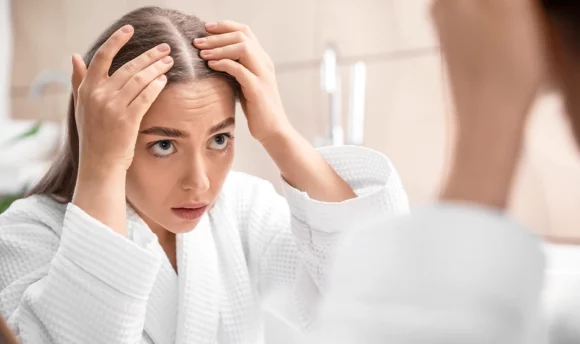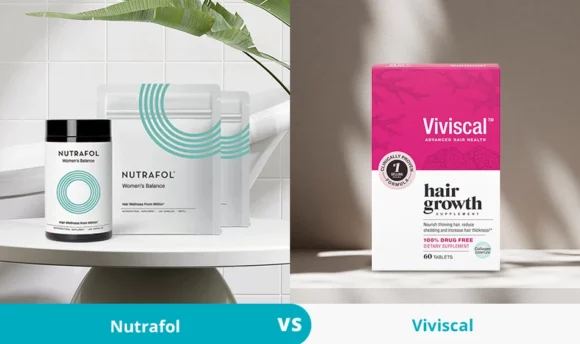Does Collagen Help Hair Growth? Separating Facts from Fiction
Is collagen for hair growth really that important, or is it a trend to avoid? We answer this question and give you the lowdown on whether it is beneficial for your hair.

Collagen supplements have burst onto the hair care scene in recent years through promotion from celebrities and wellness influencers. It is believed that they may boost healthy hair growth, thicken strands, and prevent hair loss.
However, there is limited scientific research surrounding this topic. So, although collagen supplements are popular, are they actually effective in boosting hair growth? And is collagen as important for your hair as it is in maintaining healthy skin?
Read on to explore these questions and find out if collagen could be the answer to your hair care troubles.
Does Collagen Help Hair Growth?
Collagen supplements help hair to grow as they provide the body with essential amino acids it may struggle to produce on its own. Collagen acts as a building block for maintaining healthy muscles, bones, skin, and tissues.
Although it is the most abundant protein in the human body, collagen production decreases as you grow older, beginning approximately at age 30. This can result in wrinkled skin and thinning hair.
You may therefore benefit from taking supplements of collagen for hair growth to counteract this loss, keep your skin looking youthful, and ensure that your hair continues to grow.
After taking a collagen supplement, the body begins to produce peptide fragments. Peptides are short strings of amino acids that the body can easily absorb.
Once digested, the peptides bind with copper fragments to form copper tripeptide, a complex known to have several benefits for hair health. For example, copper tripeptide may increase blood circulation in the skin.
This helps to stimulate hair follicles so that they can receive a sufficient number of nutrients to boost hair growth.
What is the best collagen type for hair growth?
Although several types of collagen may help with healthy hair growth, hydrolyzed collagen has been found to be the most effective.
This type of collagen supplement typically comes in powder form but may also be available in capsules.
Collagen that has been hydrolyzed goes through a chemical reaction with water and specialized enzymes. It is then broken down into amino acid chains, which are used to create smaller bioactive peptides.
Peptides are absorbed into the bloodstream and are then built back up to form proteins such as elastin, keratin, and collagen, all of which are essential for skin and hair health.
The best type for those following a plant-based diet is vegan collagen, which is made using genetically modified bacteria and yeast. However, collagen sourced from gelatin or sea creatures has several benefits for hair growth.
This is because animal-sourced collagen contains large amounts of lysine, an essential amino acid that does not naturally occur in the body. It is also rich in hydroxyproline, another amino acid that is vital for building keratin to maintain skin and hair health.
What Does Collagen Do for Hair?
Collagen contains 8 essential amino acids that help to build keratin in the body. Keratin is a protein that primarily forms hair tissue. Both keratin and collagen are, therefore, essential for maintaining a healthy scalp and hair follicles.
Taking collagen for hair growth has been found to increase the activity of fibroblasts, which are cells in the skin.
Fibroblasts send signals to other cells in the hair follicles that are responsible for growing new strands. By increasing the presence of collagen in the body, you are then able to grow more hair at a faster rate.
As the main component of the dermis, collagen also plays an important part in managing the loss of hair due to age, malnutrition, or genetic factors. On the scalp, the dermis is the connective tissue containing hair follicles.
For those with scalp damage, collagen works to repair the dermis and skin at the base of follicles. This creates a healthy environment for new hair strands to grow.
The amount of collagen that you take may also have an impact on its effects. For example, if your main goal is to improve skin health or promote hair growth, it is recommended to take a smaller dose of 2.5g.
However, for those looking to build muscle mass, they are advised to take a larger 15g dose.
What Are the Benefits of Collagen for Hair?
Despite the lack of definitive clinical research into the topic, there are several possible advantages to collagen for healthy hair growth and hair loss prevention.
Here are some of the potential benefits of collagen supplements:
#1 May promote hair growth
Collagen supplements contain several essential amino acids that the body is unable to produce on its own. These amino acids are used to build keratin, a protein that hair is made of.
After consuming a collagen supplement, the body breaks this down into amino acids, the building blocks it needs to create hair. Therefore, having plenty of collagen available ensures that your body can continue growing new strands of hair.
Collagen also strengthens the hair shaft, the visible part of the hair that sticks out of the scalp. This prevents breakage and creates a healthy environment for follicles to grow.
Despite this, research into the effects of collagen on human hair growth is limited. One study found that women who took supplements containing collagen for 6 months had more hair growth than the control group.
However, the supplements also contained other nutrients, such as capsaicin and keratin. Thus, it could not be concluded that collagen was the ingredient to promote healthy hair growth.
#2 May prevent hair thinning
As you age, you may experience hair thinning or loss as a result of decreased collagen production. This is because collagen aids strength and elasticity in the dermis, the layer of skin that connects the scalp with the roots of each hair.
By taking supplements, the body will have more collagen to help maintain the dermis. This means that your hair is less likely to become thin, therefore counteracting the effects of aging.
#3 Repairs damaged hair follicles
Collagen is effective in fighting free radicals, compounds in the body that develop due to poor diet, alcohol, smoking, or chronic stress.
These compounds can cause damage to hair follicles, DNA, and cells. This is especially the case for older adults, whose natural defense against free radicals weakens with age.
The antioxidative effects of collagen may be able to prevent damage to follicles caused by free radicals. However, there are few human studies on the impact of collagen, so clear conclusions cannot yet be drawn.
#4 Could slow graying
Another benefit of collagen’s antioxidative abilities is that it may help to fight free radicals, which cause your hair to go gray.
Melanin pigment gives your hair its natural color. However, as you age, the cells that produce it begin to die, resulting in graying hair. The cells may also be damaged by free radicals that develop due to environmental factors such as stress or poor diet.
Therefore, if you have enough collagen present in the body, it can help to prevent premature graying or slow down the process as you age.
Can Collagen Help with Hair Loss?
If you are suffering from thinning due to hair follicle damage or depleted collagen supplies, you may benefit from taking collagen for hair growth.
Research indicates that as an antioxidant, collagen fights free radicals in the body that may cause hair follicle damage, a leading cause of hair loss.
It also improves blood circulation, meaning that the scalp receives sufficient oxygen and nutrients to prevent the loss of hair strands.
Hair loss has been directly linked with the body’s natural depletion of collagen stores as we age, causing hair to become thin and fragile.
Collagen supplements may improve blood circulation, meaning that the scalp receives the necessary nutrients to prevent hair loss.
However, there have not yet been enough studies conducted on human subjects to say for definite that collagen can prevent hair loss in the long term.
FAQs
There is no official recommended daily allowance for collagen from health authorities. This is because the amount that you should take varies depending on the type of collagen that is present within your supplement of choice.
However, it is generally advised to take between 2.5–15g per day.
No, generally, taking too much collagen has not been linked to hair loss.
However, you may experience some uncomfortable gastrointestinal side effects, such as constipation, bloating, and feelings of fullness after eating.
If you are planning on taking more than the recommended maximum dose of 15g, you should therefore consult your doctor beforehand.
Collagen can cause facial hair growth, depending on the levels of testosterone available in the body.
Studies have shown that collagen can help cells produce testosterone. This may be beneficial for men suffering from low testosterone levels, which can have a negative impact on their mood, health, and mental well-being.
A Word From an MD
For stronger, longer, and healthier hair, the antioxidative effects provided by collagen supplements can be beneficial, particularly for those with hair follicle damage or thinning on the scalp.
However, if you want to maintain your stores of collagen for hair growth in the long term, it is also important to lead a balanced lifestyle. This involves taking regular walks, avoiding smoking, and eating a healthy diet.
Along with supplements in the form of pills and powders, there are many foods containing natural collagen stores that you could add to your diet.
This includes foods such as salmon, seafood, walnuts, and blueberries. You may also choose to drink the supplement in a collagen protein shake.
The effects of collagen are likely to vary from person to person, depending on factors such as age, metabolism, and diet. Just be sure to consult a medical professional if you plan on taking more than the recommended dosage.
Conclusion
There is plenty of evidence showing that collagen supports hair growth, prevents damage to the scalp, and may thicken strands. However, more testing is needed on human subjects to draw full conclusions.
Consume 2.5–15g of collagen per day and consult your doctor if you plan on taking more. However, keep in mind that it can take several months of consistent collagen supplementation for growth to occur, so be patient to achieve your desired results.

















































 Select your language:
Select your language: 








